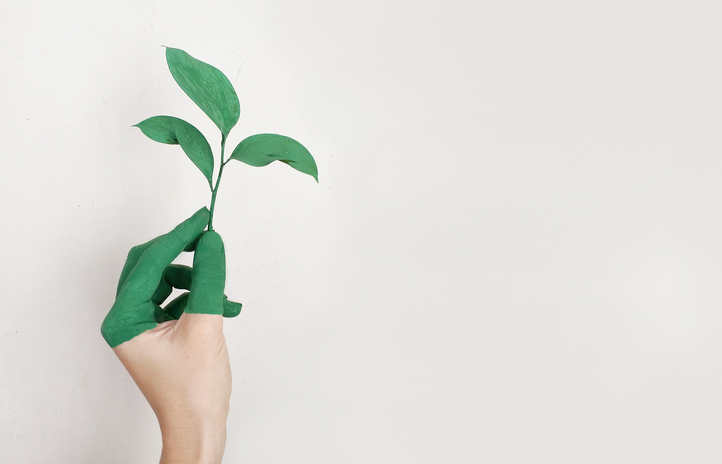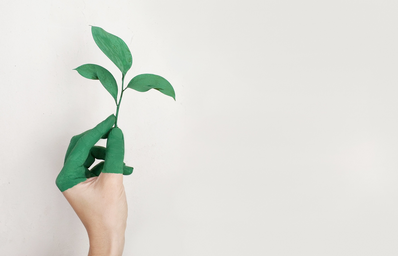During Fall 2019, I took a class called “Sustainable World,” where we learned about sustainability around the world but also at home, on campus at Mason. I was amazed at how many initiatives Mason has put forth when it comes to being sustainable and diverting waste. Here, I interview professor Doni Nolan, a sustainability professor at Mason to learn more about her as well as Mason’s sustainability initiatives.
PR: Hi Professor Nolan! Could you please tell me a little bit about your background and how you found your passion in teaching and sustainability?
DN: It’s kind of a funny story because I found my passion for sustainability at Mason. I’m from Boston and I had no idea what I wanted to study when I came to Mason. In fact, I almost transferred because I didn’t think I belonged. But, in the last attempt, I found out about the greenhouse on campus and I knew then that my calling was to grow food and to work with sustainable farming.
So, I helped to manage the organic garden on campus and I realized that I was a really good leader and was really good at managing projects and teaching on-site. I love working with students and persevering through projects. While growing up, I did a lot of theater, art and music so I had no idea that I would be working in sustainability or working with plants at all. I never had any experience and then I came to Mason and discovered that I love teaching, teaching about sustainable food systems, especially.
PR: What does a sustainable lifestyle mean to you personally?
DN: I strongly believe that there is nothing that is perfectly sustainable. A sustainable lifestyle is doing your best and you’re sustaining the effort that you put into it as well. We think a state of sustainable lifestyle is like living off the grid and not having any of your trash go to a landfill and reducing your carbon footprint and having like you know no impact on the planet, but that’s just not realistic.
So to me personally, when I teach about sustainable lifestyles, I try to just open people’s eyes to maybe things they haven’t noticed before or techniques that they can add to their lifestyle that not only makes them more sustainable but improves their own life. Such as worm composting- you can do it indoors without a yard and you can still reduce some of your waste.
Reducing your carbon footprint can also encourage you to eat more produce and vegetables that don’t need plastic wrapping, for example. Cooking and being able to make meals that are not processed or packaged is also a huge contributor to a sustainable lifestyle.
But I also lecture about sustaining your own efforts that you put in. So, instead of burning out because you’re working so hard and just giving up, you can just compost or garden. It might not be perfect all the time but forgiving yourself and liking the work that you put in is important; and something that you can sustain regularly so that it really becomes a lifestyle, not just a stage. So those are my basics that I question.
PR: What are the biggest challenges you face while living sustainably?
DN: Food waste and composting is kind of a constant struggle, especially with people that you might live with, you know, they might not be caring about composting as much, or what they throw away. Even just my own habits, sometimes I end up paying by causing food waste and of course I still throw things away, but it hurts me internally. I have this kind of eco-anxiety that I get when I see plastic in the trash or and I’m like, I don’t feel like scrubbing the Ziploc bag for the fifth time and reusing it as a whole as much as throwing it away. And that hurts. Even just turning on the heat when it gets cold, just kind of take on that pain and anxiety. It’s a little more than I need, so I try to let go of the negativity and fear, all the fear of wasting food and plastic.
I focus more on the abundance: the fact that I can afford good reusable plastic bags, that I’m still able to use reusable shopping bags during COVID, the fact that I can walk into a grocery store in my town and it’s full of food, full of abundance and is accessible to me.
You’re trying to focus on the gratitude, rather than all the pain from the waste, because that’s not really helping my life and my efforts, right? I want to sustain my efforts in my lifestyle and by doing that, I’m going to be more positive and I’m going to compost what I can, I’m going to use reusable when I can and I’m going to focus on the positivity around that. But that is a big challenge for me is the anxiety of all of us. Terrible. And this, of course, the eco-anxiety is a real thing.
PR: What do you recommend to college students who want to adopt that lifestyle but don’t know where to start?
DN: We always recommend volunteering! If you go to our website (green.gmu.edu), you can find it. Our interactive map is amazing if you haven’t checked it out. You can see what’s on-campus that is sustainability-related and where you might want to get involved. There is my greenhouse and garden site and where they’re located. Carpooling is an option (maybe not now with COVID). But volunteering is going to be the best way to get some hands-on experience with how to grow food and how to compost, because that’s where you’re going to learn the best (reading things online or in a book is only going to get you so far in terms of support and encouragement). So when you get to volunteer, it gives you a hands-on training for free.
The greenhouses are year-round if needed and you can watch our videos (I have a lot of videos I made for COVID as well on my YouTube channel). But you can actually sign up to volunteer to help us harvest and you can take home some of our microgreens and get to taste them. It’s really exciting!
We also have the two gardens, the Innovation Food Forest and the Potomac Heights garden, which is a great way to learn how to identify edible flowers or how to grow your own food and compost as well.
We have all kinds of free resources to bring your waste to campus. So if you’re comfortable with composting, you can start to compost from home but bring your waste to campus, which will be more encouraging to actually start composting at home. We have constant fresh air ventilation and everyone’s wearing masks so it’s still safe. We highly recommend volunteering with us if you’re interested in adopting a sustainable lifestyle!
PR: What initiatives has Mason started to promote sustainability on campus?
DN: Mason has several sustainability initiatives on campus. There’s the greenhouse, where I started the garden. We’re also composting from three dining halls on campus and most of their biodegradable waste is going to an industrial composter in Fairfax and Maryland so we’re diverting a ton of waste from the landfills to get composted on an industrial level. We are also working on recycling glass on campus, have a honeybee initiative and solar panel charging stations on campus.
The Patriot green fund is a really great initiative where students can apply for money to do projects that relate to sustainability on campus, either research or infrastructure, and I manage a lot of these projects. If any of them have to do with landscaping or plants, I’m usually involved.
I have two PGF projects that just got submitted last week that I’m hoping will get approved. One of them will bring plants into the greenhouse and the other one was to plant trees in a reforestation area on campus. There’s so much on sustainability and you can check out the website I mentioned earlier to learn more!
Be sure to check out Doni on Youtube (@doniellenolan and @greengmu) as well as Mason’s Office of Sustainability website (green.gmu.edu) if you want to learn more.


